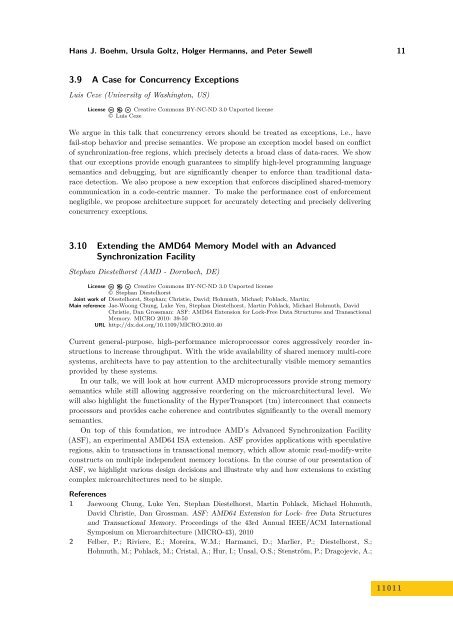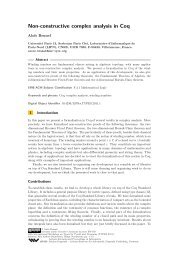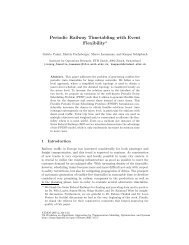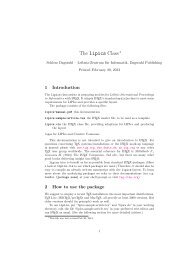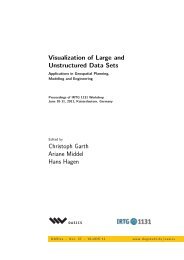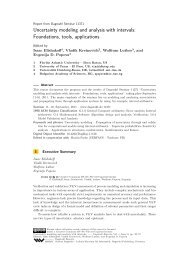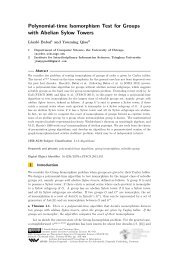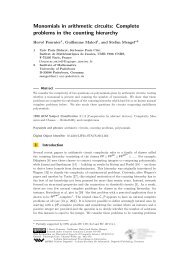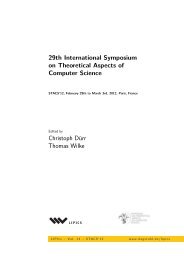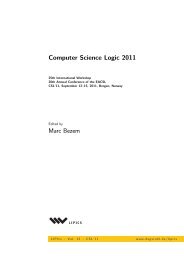Volume 1, Issue 1, January 2011 - DROPS - Schloss Dagstuhl
Volume 1, Issue 1, January 2011 - DROPS - Schloss Dagstuhl
Volume 1, Issue 1, January 2011 - DROPS - Schloss Dagstuhl
Create successful ePaper yourself
Turn your PDF publications into a flip-book with our unique Google optimized e-Paper software.
Hans J. Boehm, Ursula Goltz, Holger Hermanns, and Peter Sewell 11<br />
3.9 A Case for Concurrency Exceptions<br />
Luis Ceze (University of Washington, US)<br />
License Creative Commons BY-NC-ND 3.0 Unported license<br />
© Luis Ceze<br />
We argue in this talk that concurrency errors should be treated as exceptions, i.e., have<br />
fail-stop behavior and precise semantics. We propose an exception model based on conflict<br />
of synchronization-free regions, which precisely detects a broad class of data-races. We show<br />
that our exceptions provide enough guarantees to simplify high-level programming language<br />
semantics and debugging, but are significantly cheaper to enforce than traditional datarace<br />
detection. We also propose a new exception that enforces disciplined shared-memory<br />
communication in a code-centric manner. To make the performance cost of enforcement<br />
negligible, we propose architecture support for accurately detecting and precisely delivering<br />
concurrency exceptions.<br />
3.10 Extending the AMD64 Memory Model with an Advanced<br />
Synchronization Facility<br />
Stephan Diestelhorst (AMD - Dornbach, DE)<br />
License Creative Commons BY-NC-ND 3.0 Unported license<br />
© Stephan Diestelhorst<br />
Joint work of Diestelhorst, Stephan; Christie, David; Hohmuth, Michael; Pohlack, Martin;<br />
Main reference Jae-Woong Chung, Luke Yen, Stephan Diestelhorst, Martin Pohlack, Michael Hohmuth, David<br />
Christie, Dan Grossman: ASF: AMD64 Extension for Lock-Free Data Structures and Transactional<br />
Memory. MICRO 2010: 39-50<br />
URL http://dx.doi.org/10.1109/MICRO.2010.40<br />
Current general-purpose, high-performance microprocessor cores aggressively reorder instructions<br />
to increase throughput. With the wide availability of shared memory multi-core<br />
systems, architects have to pay attention to the architecturally visible memory semantics<br />
provided by these systems.<br />
In our talk, we will look at how current AMD microprocessors provide strong memory<br />
semantics while still allowing aggressive reordering on the microarchitectural level. We<br />
will also highlight the functionality of the HyperTransport (tm) interconnect that connects<br />
processors and provides cache coherence and contributes significantly to the overall memory<br />
semantics.<br />
On top of this foundation, we introduce AMD’s Advanced Synchronization Facility<br />
(ASF), an experimental AMD64 ISA extension. ASF provides applications with speculative<br />
regions, akin to transactions in transactional memory, which allow atomic read-modify-write<br />
constructs on multiple independent memory locations. In the course of our presentation of<br />
ASF, we highlight various design decisions and illustrate why and how extensions to existing<br />
complex microarchitectures need to be simple.<br />
References<br />
1 Jaewoong Chung, Luke Yen, Stephan Diestelhorst, Martin Pohlack, Michael Hohmuth,<br />
David Christie, Dan Grossman. ASF: AMD64 Extension for Lock- free Data Structures<br />
and Transactional Memory. Proceedings of the 43rd Annual IEEE/ACM International<br />
Symposium on Microarchitecture (MICRO-43), 2010<br />
2 Felber, P.; Riviere, E.; Moreira, W.M.; Harmanci, D.; Marlier, P.; Diestelhorst, S.;<br />
Hohmuth, M.; Pohlack, M.; Cristal, A.; Hur, I.; Unsal, O.S.; Stenström, P.; Dragojevic, A.;<br />
1 1 0 1 1


